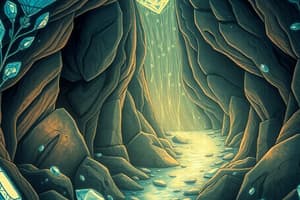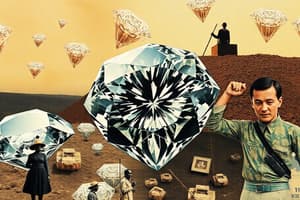Podcast
Questions and Answers
What technology was used to discover the 2,492-carat diamond in Botswana?
What technology was used to discover the 2,492-carat diamond in Botswana?
- X-ray technology (correct)
- Ultrasonic imaging
- Laser scanning
- Satellite imaging
Which diamond is recognized as the largest ever discovered to date?
Which diamond is recognized as the largest ever discovered to date?
- Sewelô diamond
- Star of Africa
- Hope diamond
- Cullinan diamond (correct)
What is the estimated value of the newly discovered diamond?
What is the estimated value of the newly discovered diamond?
- Tens of millions of dollars (correct)
- Less than $1 million
- Around $1 million
- Over $100 million
How deep underground do diamonds typically form?
How deep underground do diamonds typically form?
What is the primary element involved in the formation of diamonds?
What is the primary element involved in the formation of diamonds?
Which of the following gems is NOT a result of cutting the Cullinan diamond?
Which of the following gems is NOT a result of cutting the Cullinan diamond?
How long is it believed that most natural diamonds have existed?
How long is it believed that most natural diamonds have existed?
In which year was the Sewelô diamond sold to Louis Vuitton?
In which year was the Sewelô diamond sold to Louis Vuitton?
Flashcards
Largest Diamond Ever Found
Largest Diamond Ever Found
The Cullinan diamond, discovered in South Africa in 1905, weighs 3,106 carats.
Second Largest Diamond
Second Largest Diamond
The 2,492-carat diamond found in Botswana in 2024 is the second biggest diamond ever discovered.
Karowe Mine
Karowe Mine
A diamond mine in Botswana known for producing exceptionally large diamonds, including the 2,492-carat diamond and the 1,758-carat Sewelô diamond.
Diamond Formation
Diamond Formation
Signup and view all the flashcards
Diamond Age
Diamond Age
Signup and view all the flashcards
Diamond Value
Diamond Value
Signup and view all the flashcards
Cullinan Diamond's Fate
Cullinan Diamond's Fate
Signup and view all the flashcards
Study Notes
Botswana Diamond Discovery
- A 2,492-carat diamond was discovered in the Karowe mine, Botswana, on August 22, 2024. This is the second-largest diamond ever found.
- The largest diamond discovered is the 3,106-carat Cullinan diamond, found in South Africa in 1905.
- The new diamond was discovered using X-ray technology.
- The Karowe mine is known for its significant diamonds, including the 1,758-carat Sewelô diamond, previously the world's second-largest, sold to Louis Vuitton.
- The diamond is expected to fetch tens of millions of dollars.
Diamond Characteristics and Formation
- Diamonds form when carbon atoms are compressed under high pressure deep underground, exceeding 2,000°F (1,093°C) and at depths of over 93 miles (150 km).
- Diamonds are later brought to the surface via volcanic eruptions.
- Many natural diamonds are billions of years old, some exceeding three billion years.
Cullinan Diamond (Example)
- The Cullinan diamond was cut into nine large and nearly 100 smaller gems.
- Two notable Cullinan gems are part of the British Crown Jewels:
- The 530.2-carat Cullinan I is in the Sovereign's Sceptre with Cross, used in every coronation since 1661.
- The 317-carat Cullinan II is the centerpiece of the Imperial State Crown, worn by Queen Elizabeth II annually for the State Opening of Parliament.
Studying That Suits You
Use AI to generate personalized quizzes and flashcards to suit your learning preferences.





